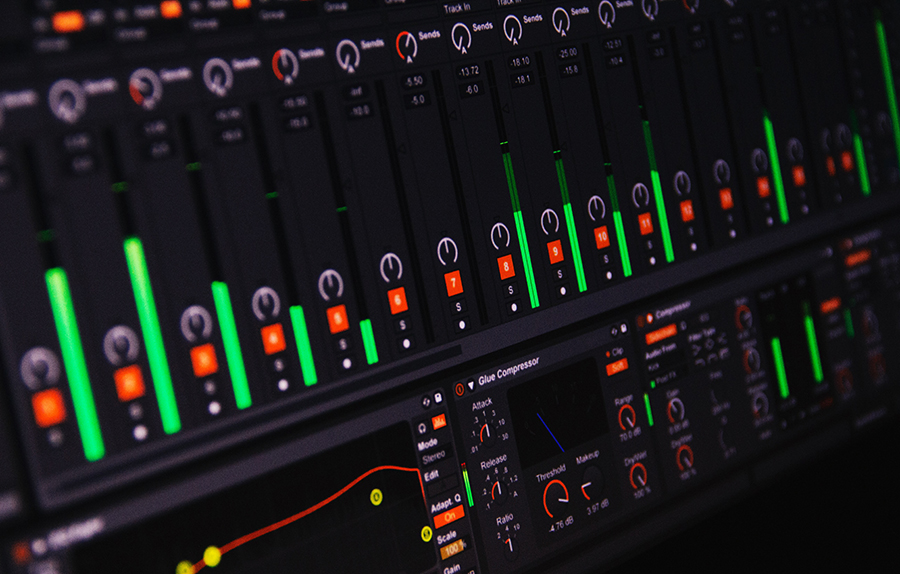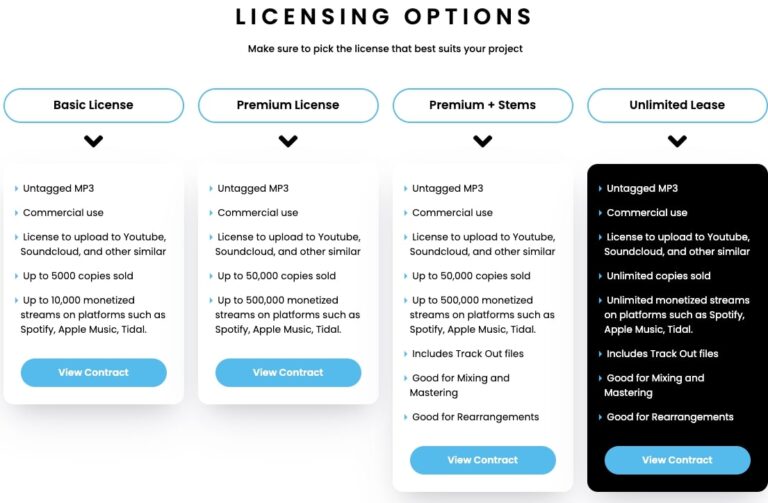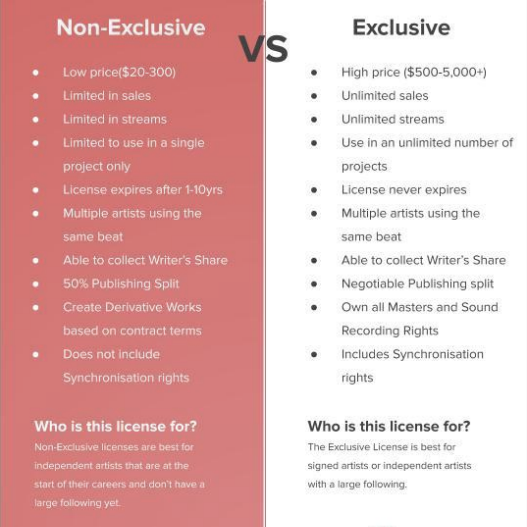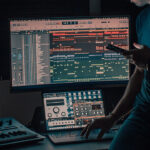
Part 1: Beat Licensing Explained
The concept of beat licensing is not hard to understand. A producer makes a beat and uploads it to their beat store. Any artist can buy these beats directly from the store and use it for their own songs.
In exchange for their purchase, the producer will provide the artist with a license agreement. A document that grants the artist certain user-rights to create and distribute a song.
This license agreement is legal proof that the producer has given them permission to use the beat.

A common misconception is when artists ask producers for free beats. Even when a producer agrees and sends the artist a free beat. The truth is, that free beat is useless as there is no legal proof and permission to use it. This is where the license agreement comes in.
Before we go any further, we have to let go of the common phrases of “buying beats” and “selling beats”. The product that we’re dealing with here is simply not the beat itself. It is the license agreement.
Non-Exclusive Beat Licensing
Non-exclusive licensing, also known as ‘leasing’, is the most common form of beat licensing. For anywhere between $20-300, you can buy a non-exclusive license agreement and release a song on iTunes, Spotify, Apple Music, create a music video for YouTube, and make money from it!
These are also the types of licenses that are directly available from the producer’s beat store. In other words, you don’t have to inquire for them and you can instantly buy a license from the online store.
In most cases, a license agreement is auto-generated, including the buyer’s name, address, a timestamp (Effective Date), the user-rights and the information of the producer.
With a non-exclusive license, the producer grants the artist permission to use the beat to create a song of their own and distribute it online. The producer will still retain copyright ownership (more about this later) and the artist has to adhere to the rights granted in the agreement.
The limitations of Non-Exclusive Licenses
Most non-exclusive licenses have a limitation on sales, plays, streams or views. For example, the license might only allow a
maximum number of 50,000 streams on Spotify and/or 100,000 views on YouTube.
A non-exclusive license also has an expiration date. Meaning that it’s only going to be valid for a set period of time. This could be anywhere between 1-10 years. After the contract period is due, the buyer has to renew the license. In other words, buy a new one.
The license will also need to be renewed as soon as the buyer reached the maximum amount of streams and/or plays. Even if that’s before the contract’s expiration date (!)
Since these licenses are non-exclusive, a single beat can be licensed to an unlimited number of different artists. This means that several artists could be using the same beat for a different song under similar license terms.
Whether this is a problem depends entirely on what stage the artist is. A beginner artist would be best off with a non-exclusive license, while a signed artist or an artist that is on the verge of blowing up might be better off with an exclusive license.
The different types of Non-Exclusive Licenses
Most producers offer different non-exclusive licensing options. In my case, I offer an MP3, WAV, Premium, and Unlimited License. Every option comes with its own unique user-rights. These user-rights are often displayed in licensing tables, similar to mine below.

Obviously, the more expensive the license, the more user-rights you’re getting. These more expensive licenses also come with
better quality audio files.
In my case, the second-highest tier, the Premium license, is the most popular. That’s simply because you get the best audio quality, tracked out files of the beat and good user-rights.
Artists who believe these rights still aren’t sufficient for their song, usually go for the highest tier. The Unlimited license. Or even better, an Exclusive license.
Exclusive Beat Licensing

These are the main differences between non-exclusive licenses and exclusive licenses. But it goes further than that and there’s often confusion around the topics of rights and royalties.
Going forward in this guide, we will go more in-depth about Royalties, Publishing and Copyright.
Two very different ways of selling Exclusive Rights
- Selling exclusive rights
- Selling exclusive ownership
Part 2: Everything you need to know about Royalties, Writers Share and Publishing Rights
- Mechanical Royalties
- Performance Royalties
Who gets the Mechanical Royalties?
Advances against Mechanical Royalties in Exclusive Agreements
I intentionally said that “in most cases” the artist gets to collect 100% of the mechanical rights because this does not always apply. There’s an exception to this, which only applies to exclusive rights.
Some producers (including myself) ask for a tiny percentage of the Mechanical Royalties in their exclusive agreements. This could be anywhere between 1-10%.
This is also known as ‘points’ or ‘producer royalties’.
In this scenario, the price an artist pays for the exclusive rights is considered an “advance against mechanical royalties” that might become due in the future. It will be calculated over the Net Profit of a song. Meaning that all costs to create the song, including the exclusive price may be deducted first before the producer gets his cut.
Here’s an example to show you how this could potentially play out in a real-life situation.
Let’s say a producer sells the exclusive rights to a beat for $1,000
USD as an advance against royalties. His mechanical royalty rate is set to 3%.
The artist paid:
- $1,000 for exclusive rights
- $500 for studio time
- $500 for getting the song mixed and mastered
Total expenses = $2,000
After 1 year, the song generated $10,000 in Mechanical Royalties!
The Net Profit: $10,000 – $2,000 expenses = $8,000
The Producer’s Cut: 3% of $8,000 = $240
As an independent artist, $8,000 is a lot of money to generate on Mechanical Royalties. Still, only $240 has to be paid to the producer.
Why an Advance against Royalties?
Who collects the Performance Royalties?
- Songwriter Royalties (A.k.a. Writer’s Share)
- Publishing Royalties
- $0.50 goes to Songwriter Royalties
- $0.50 goes to Publishing Royalties.
- The $0.50 Songwriter Royalties will be paid out to the songwriters directly by the PRO.
- The other $0.50 publishing royalties will be paid out to a publishing company or publishing administrator. (more about this later).
What are songwriter royalties?
- 50% Producer
- 25% Writer 1
- 25% Writer 2
- 30% Producer
- 35% Writer 1
- 35% Writer 2
What are Publishing Royalties?

In terms of licensing beats online–regardless of an exclusive or non-exclusive license–the percentage of publishing rights is generally the equivalent of the writers share.
50% of writers share equals 50% publishing share.
Part 3: The Copyright Situation…Who owns what?
Performing Arts Copyright (PA-Copyright)
- The Music
- The Lyrics
- If you have exclusively licensed a beat, you do own the master and sound recording rights.
- If you have non-exclusively licensed a beat, you do not own the master and sound recording rights.
What’s a Derivative Work?
Exclusive or Non-Exclusive, what is best for you?
- How many followers and fans do you have?
- How many songs have you released to date?
- What is the number of plays/stream you get on average? (all platforms combined)
- How big is your marketing budget?
- Are you getting financial support from a label or publisher?
A summary of the differences between Exclusive and Non-Exclusive Licenses

Part 4: FAQ About Beat Licensing
I want to license a beat that is already sold by the producer. Can I reach out to the exclusive purchaser so they can sell me a license?
Someone wants to buy a beat I already sold and asks if I can create a similar one. Can I?
I recently bought a non-exclusive license for a beat. Now someone else bought it exclusively. What happens to my song?
My non-exclusive license is reaching its streaming limit but I can’t buy a new license because the beat is already sold exclusively. Do I have to take the song down now?
Someone released a song with one of my beats but didn’t get a license? What’s the best course of action?
- Either buy a license so they can keep the song online
- Or remove the song entirely from all platforms it’s published on
- Leave it be
If the song isn’t really gaining numbers and is of very poor quality (which is usually the case when beats are used unauthorized), it might be best to leave it be. It’s not worth your time and money.
I created a beat with another producer. How do we split the publishing and songwriters share?
- Producer 1: 25%
- Producer 2: 25%
- Artist: 50%
